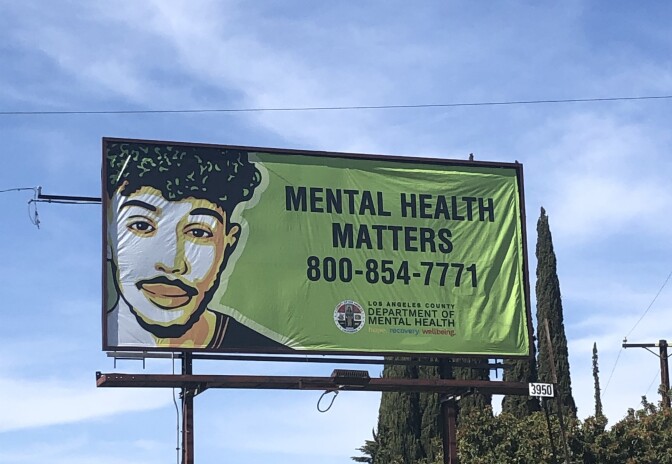This story is free to read because readers choose to support LAist. If you find value in independent local reporting, make a donation to power our newsroom today.
New 988 Mental Health Crisis Hotline Goes Live In July — But Is There Enough Money For It?

A group of U.S. lawmakers is asking Congress to throw more support behind the launch of 988, the new national suicide prevention and mental health crisis lifeline that goes live in July.
If You Need Immediate Help
If you or someone you know is in crisis and need immediate help, call the Suicide Prevention Lifeline by dialing 988 or go here for online chat.
Find 5 Action Steps for helping someone who may be suicidal, from the National Suicide Prevention Lifeline.
Six questions to ask to help assess the severity of someone's suicide risk, from the Columbia Lighthouse Project.
To prevent a future crisis, here's how to help someone make a safety plan.
When it’s fully operational, 988 will represent the beginning of a national shift from relying on traditional emergency responders — very often police — to respond to mental health crises.
“Time and again, we’ve seen repeating tragedies of law enforcement killing people in a mental health emergency,” Rep. Tony Cárdenas (D-LA), said at a press conference Thursday to announce legislation that would bolster the 988 effort.
For 988 to be successful, there must be “someone to call, someone to come and somewhere to go," he said.
But that will require resources, and there are concerns about whether current crisis response infrastructure will be able to meet demand.
There are currently 13 call centers in California that keep the National Suicide Prevention Lifeline operational. Some advocates worry those centers won’t be ready to field new calls with increased demand from 988.
The Los Angeles-based nonprofit Didi Hirsch Mental Health Services is coordinating much of the 988 call center implementation for California. It already runs one of the 13 centers.
“We are anticipating about two to three-fold the volume of calls, chats and texts,” Didi Hirsch CEO Jonathan Goldfinger said.
It’s not clear yet whether that anticipated increased call volume will mean his group needs to triple the amount of volunteers and staff, he said.
“The thing that keeps me [up] at night the most [is] the sheer number of lives who need us and that we’re not necessarily ready yet to serve them, whether through the calls, chats and texts or in-person," Goldfinger said.
The 988 Implementation Act would pour hundreds of millions of dollars into the operation, including $441 million in federal funding for technology, training and operations for the 250-plus regional/local lifeline call centers across the country, as well as $100 million for a new pilot program for communities to create or enhance existing mobile crisis response teams.
In L.A., the County Board of Supervisors voted last fall to roughly double the number of Department of Mental Health Psychiatric Mobile Response teams. The PMRTs are an alternative to a law enforcement response, but wait times can often be several hours or even a whole day. Supervisors want the mobile response teams to eventually be available 24/7 as a resource for 988 calls.
Cárdenas pointed out that many Americans might not remember that 911 wasn’t always synonymous with medical and other emergencies.
“Sixty years ago, if you needed emergency medical assistance, there wasn’t 911,” he said.
Cárdenas said the stakes are high: “Right now America’s default for people who need immediate help when they experience mental health crisis is calling 911, and the default treatment facilities are jails and emergency rooms."








